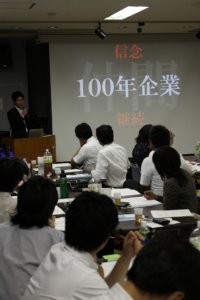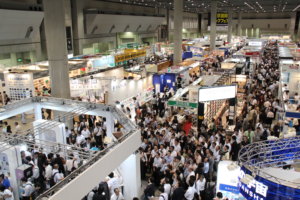Japan's Senior Business: The Arrival of Senior Business in Japan
CONTENTS
The companies shifting toward senior business and new product development
In 2020, the average life expectancy in Japan was 85.9 years for women and 79.44 years for men. In addition, the fertility rate was 1.3 children per woman. Based on these figures, the general population of Japan is expected to fall by around 33m to 95m by 2050.
With the population of senior citizens increasing year by year, companies are starting to put efforts into uncovering “senior business” opportunities that target the growing numbers of senior citizens. The background to this is the en-masse retirement of the baby boomer generation and the large amount of cash saved up by senior citizens. Members of the baby boomer generation born between 1947 and 1949, which was the primary post-war baby boom, are welcoming in their retirements one after another. Baby boomers’ retirement allowances are estimated to total as much as 50 trillion yen. Companies have decided that this offers new business chances.
The increase in active seniors
In 2020, around 43% of Japan’s general population of 128m was aged 50 or over, while around 22% were aged 65 or over – and these figures will continue increasing in the future. Added to this, the trend among Japanese consumers until now has generally been to save money for a rainy day, forgoing luxuries and not using money particularly pro-actively. However, members of the baby boomer generation have a wide variety of hobbies and likings, and have a hearty appetite for learning. They purchase expensive goods if they find something that fits with their own values. Walking around sightseeing spots, one often catches sight of senior citizens in their 70s taking photos with expensive cameras. Come sightseeing season, hordes of senior citizens gather outside Kyoto station from morning onwards to take part in various package tours. Gourmet tours and the like are the same. Moreover, now that they have the time, demand among senior citizens is also growing for activities they were enthusiastic about or were unable to do when they were younger, such as playing musical instruments, mountain climbing, or ladies’ hula dancing.

In short, the baby boomers aren’t quietly spending their post-retirement years relaxing at home. Rather, they lead an “active senior” lifestyle.
To enable them to enjoy a healthy, independent and meaningful life, the active senior segment are said to have a strong interest in health and fitness. This is why fitness programs aimed at seniors are being developed across the country. Seniors-only sports clubs are also springing up. Here, seniors can enjoy exercise at their own pace undaunted by younger members. Senior attendance at these special gyms – and even at regular gyms – is growing notably. Examples of small talk such as the following are springing up among their conversations:
“How are you feeling?” “I’m good. The other day, I enjoyed myself at a hot spring resort.”
The greatest concern of the senior citizen: "health"
The topics that rate highest among the concerns of senior citizens are age-related health anxieties. The following is a simple schematic of how they maintain their health:
To stay healthy and prevent the onset of illness…
- Build up physical strength → Attend a fitness club.
- Watch what one eats → Obtain safe ingredients.
- Live a full life by enjoying hobbies and mixing with acquaintances, occasionally making use of one’s life experiences and skills in volunteer activities, too.
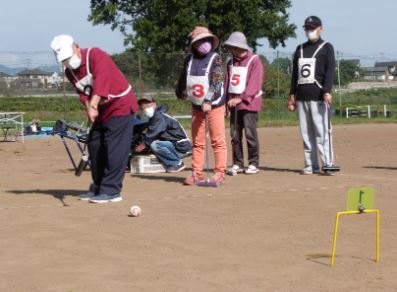
In addition, since many in the active senior segment have knowledge and experience of operating computers, there are surprisingly many senior internet users. According to a Ministry of Internal Affairs and Communications survey into telecom use trends, while internet penetration nationwide was about 78% in 2020, it was a full 63% among those in their 60s. Using online shopping sites to order things such as groceries and clothes doesn’t seem to bother them much. They especially depend on internet shopping in cases where driving a car isn’t possible or getting to a shopping center is difficult. In addition, the internet allows them to easily search for things such as information about their hobbies.
Given these types of factors, goods and services targeted at seniors are considered sizeable new growth markets. Let’s take a look at some examples of companies which have started to move toward attaining a slice of Japan’s senior market.
Case Study: Retail Industry
Aeon’s grand design strategy
Aeon, which operates over 420 hypermarkets and 1,000 food supermarkets nationwide, plus 54 hypermarkets and 44 food supermarkets overseas, is a retailer with a clearly thought-out senior business strategy. Although the changes observed in senior consumption behavior follow the patterns mentioned earlier, Aeon is positively trying to respond to the demands of active seniors. The strategy employed by Aeon is to use market research to determine the items senior consumers need and alter their products accordingly. The Aeon mall in Funabashi, Chiba prefecture, opened April this year and features an enhanced specialist store section for hobbies that stocks goods such as bicycles, travel items, as well as wine and imported foodstuffs.
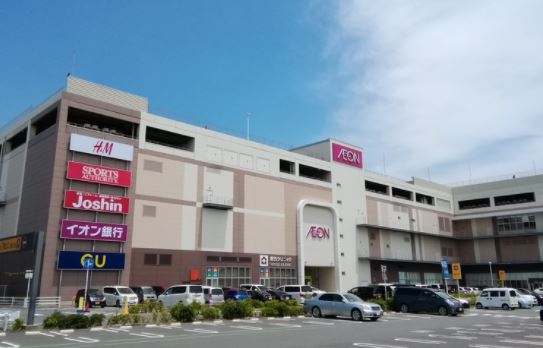
The aim of this new outlet is to construct a business model which supports all aspects of senior life. Of course, it’s not just a shopping center for seniors. As an Aeon spokesperson explains, “We’re sure that while senior citizens can come here to shop with peace of mind, other generations will also naturally find it convenient. While we’ve made adaptions for seniors, families who come with their children can also enjoy themselves. This shopping center serves all generations.”
Some examples of support to make life easier for seniors follow below:
* Payment by electronic money
Aeon offers a store card called “YuYu WAON” targeted at those aged 65 or over, and has already issued a sum total of over 1,000,000. A monitoring survey is used to listen to cardholders’ demands, which are then reflected in areas such as product development and store layout.
Cardholders can go shopping with just this one card – without having to carry around small change. As pension payments are made on the 15th of every even-numbered month, Aeon offers an extra five percent off any shopping bought with the card on the 15th of every month.
* Adapted stores
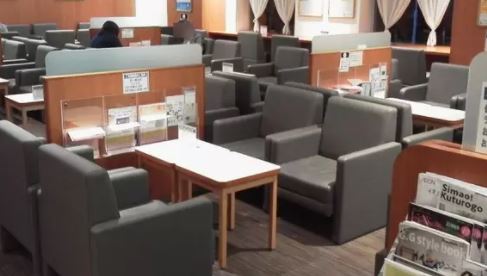
Aeon has made various adaptations to its stores such as slowing down the speed of descending escalators, making aisles wider so that walking frame or even wheelchair users can pass by with room to spare, placing chairs and sofas inside stores so that customers can take a break, and making point-of-purchase signs and the text written on them larger, which makes them easier to see and thus makes products easier to locate. In addition, Aeon has set up airport lounge-type areas called “Aeon Lounge” where customers can take their time to rest up. It should be noted that only Aeon gold card members or Aeon Lounge members can use the lounge.
However you look at it, one thing that’s convenient for everyone as well as seniors is easy-to-find products. In addition to product category signs, product lines also have large point-of-purchase signs written in large text, so even customers at the end of the aisle can tell straight away what products are located where. Furthermore, for those concerned about their health, features such as “reduced salt” are also indicated, which makes it easier to find the products of one’s choice.
* Adapted products
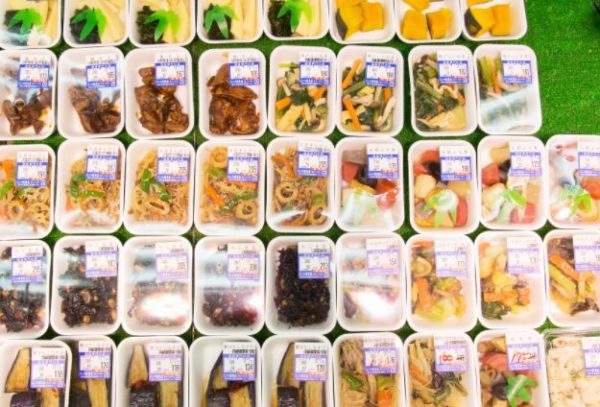
Selling multipack products separately or in small volumes is another new approach. Two seniors living as a couple consume small volumes of food, so vegetables bought whole will soon spoil and go to waste. The problem is worse for senior citizens living alone. Products sold in small volumes are a real help toward stopping fresh goods from going to waste. That’s why Aeon’s approach is to retail goods in small volume packs, separate packs, and in sell-by-measure format.
A 76 year old male who came to the Aeon Funabashi outlet to shop noted, “There are only two of us in our household, so buying lots of foodstuffs or ingredients would be a waste, plus carrying a heavy load home is tough. I’d prefer to purchase fresh food little-by-little, and only as much as we need.” But isn’t coming to the store every day also tough? “I come from a housing complex of around 1,500 households. Recently, a bus service runs from there to Aeon on a trial basis, and my wife and I take it in turns to come, so it doesn’t bother us. Plus, we can take a stroll while we’re at it, so it’s just right.” Aeon also sells sauces and condiments in such small sizes you might think they were promotional samples at first glance. However, as the amount seniors consume in one go is also small, it seems even these small sizes last upwards of two weeks.
In addition to these small-sized products, frozen food versions of Japanese sweets and bread products are said to be proving popular – and not just among seniors. According to a store representative, “There are times when you want to eat a few Japanese sweets, but if the use-by date is close by, you won’t be able to finish them all in time. Frozen foods are convenient because you don’t have to worry about the use-by date. They are popular among general consumers as well as seniors.” The store section for these frozen foods is marked “Ready Meals” and the product line-up boasts a wide range of foods such as main dishes, side dishes and soups – as well as indulgencies like Japanese sweets.
Aeon doesn’t stop at foodstuffs. It is developing its own range of products targeted at over 50s and has set up an “Adult Wear Collection” store section. Aeon retails a “Top Value Premium” brand, which is a range of products that delivers fashion sense while taking into account customers’ changing body proportions. In addition, Aeon exclusively retails 24 types of underwear under its HAI brand, which is a tie-up with top ladies’ undergarment maker Wacoal that offers underwear with functional properties such as ease of movement and elimination of age-related odors. Aeon also retails the “Part 2” ladies’ brand by the globally-known designer Junko Shimada, and the gentleman’s brand “Full House.”
In other areas, Aeon has also collaborated with the specialist glasses store “Optovalue,” which has an enhanced line-up of bi-focal glasses, and with a Korean cosmetics company to offer “The Golden Shop” skincare products for over 40s.
* Lifestyle services
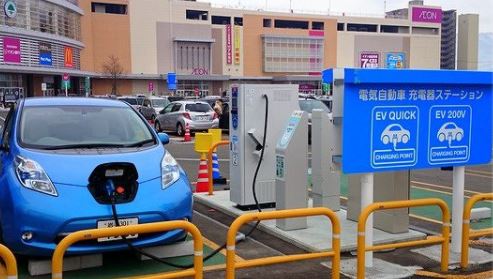
Aeon Group has also established a point of contact for its Aeon Bank and Aeon Insurance services under the banner “Lifestyle Money Plaza.” According to a spokesperson, “Customers have mentioned that the Plaza allows them to easily discuss matters such as insurance in a familiar environment without having to visit a bank each time. They can do this as an additional task while going shopping.”
In addition, Aeon has established a medical mall where patients can access consultations with specialists in each branch of medicine from a single reception point. As well as for senior citizens, being able to access medical treatment for their children while out shopping is also very convenient for mothers. As the customer who spoke earlier added, “Being able to get a check-up while out shopping allows me to save time, which is a real help.”
In these ways, while pro-actively drawing in visitors from the senior segment, the approaches employed at Aeon shopping centers can also satisfy visitors in the family segment.
Fitness Industry
Both the staff and users of “Curves” are exclusively female. Although not targeted at seniors, Curves is proving popular among 40-69 year old ladies who take care of their health and aspire to an independent lifestyle. Curves was a new entrant to the market in 2005, but its popularity steadily grew and it now boasts over 430,000 members and has rolled-out around 1,000 outlets nationwide. Curves’ basic offer is a 30 minute workout that doesn’t require a reservation, but Curves’ greatest feature is that it is located close to residential areas. Being able to call in casually is another reason behind its popularity.
Oasis sports clubs, which are operated by the Tokyu Group, have also set-up fitness studios for seniors with instructors who are specialists at working with senior citizens. The studios provide programs to maintain and increase balance ability and muscle strength via simple exercises such as yoga and calisthenics. The strategy of retailing from the customers’ perspective is paying off.
The home delivery industry
Major convenience store operator Seven Eleven runs a meal delivery service for subscribers called “Seven Meal.” The service provides a freshly-made boxed meal for lunch and dinner with a different menu every day, which can be picked up from a nearby Seven Eleven store or delivered to one’s house. Delivery is free if the order is 500 yen or more and the boxed meals also indicate the amount of salt and calories they contain. Although the service, which can be ordered on the internet, was targeted at senior citizens and those physically unable to go shopping, its appeal has spread to a wide range of consumer segments, such as two-income families. There are over 260,000 subscribers.
In addition to boxed lunches, an abundance of foodstuffs are available by delivery, such as ready-meal sets and meal ingredient sets. Other than Seven Eleven, Watami Takushoku is another company developing the home delivery boxed lunch business, and plans to enhance its boxed lunch home delivery service for senior citizens during 2020.
The travel industry
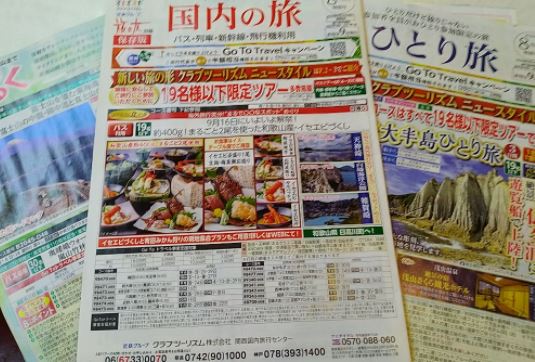
Club Tourism sells a product called the “One person only limited trip,” which enables customers to book one-person plans with no hassles. The simplicity of Club Tourism’s one-person trips is their selling point, but there is also the enjoyable prospect of strangers becoming new friends at the destination. The plans are adapted to heighten customer satisfaction by appealing to various objectives – from history and Buddhist sculpture to studying artworks and enjoying mountain climbing. In a certain sense, the plans are cultural tours that satisfy customers’ appetite for learning and also allow them to enjoy sports.
In addition to these uniquely thought-out tours, travel companies are starting to work toward unearthing demand in post-retirement leisure. Nippon Travel Agency, for example, offers commemorative trips for retired couples.
With consumers’ viewpoints diversifying, matching product development and retail strategy with individuals’ hobbies and likings is an important point for businesses. This also applies to the senior segment, which will grow increasingly large in the future. Although it requires companies to fine-tune their efforts and services, the senior market is large. Satisfied consumers become repeat purchasers and develop trust in that company. A company that operates by seeking out the consumer’s perspective in this way could take the senior market by storm.

